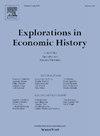The economic power of elites, human capital, and industrial change in late Imperial Russia
IF 1.7
1区 历史学
Q1 ECONOMICS
引用次数: 0
Abstract
This paper studies the economic impacts of land ownership concentration among the aristocratic elite in the Russian Empire. I document that areas with a higher concentration of noble land ownership were associated with lower levels of primary education during 1880–1911. Exploring the mechanisms, I show that by controlling local governments the landed elites decreased public spending on education, shifting the financial burden to peasant households in the 1880s–1890s. I also demonstrate that the extension of school provision through a government program of schooling subsidies after 1905 led to a relatively large increase in enrollment rates in regions with high noble landownership concentration, suggesting initial underinvestment in education in these areas. Finally, the paper identifies a significant negative influence of landed elites on industrial growth and firm productivity, with up to 56% of this effect attributable to the human capital channel.
俄罗斯帝国晚期精英、人力资本和工业变革的经济力量
本文研究了俄罗斯帝国贵族精英的土地所有权集中对经济的影响。我的文献表明,在1880-1911年间,贵族土地所有权集中度较高的地区,其小学教育水平较低。通过对机制的探索,我发现,在19世纪80年代至90年代,土地精英通过控制地方政府,减少了公共教育支出,将财政负担转移到了农民家庭身上。我还证明,1905年之后,通过政府的教育补贴计划扩大了学校的供应,导致贵族土地所有权高度集中的地区入学率相对大幅上升,这表明这些地区最初的教育投资不足。最后,本文确定了土地精英对产业增长和企业生产率的显著负面影响,其中高达56%的影响可归因于人力资本渠道。
本文章由计算机程序翻译,如有差异,请以英文原文为准。
求助全文
约1分钟内获得全文
求助全文
来源期刊

Explorations in Economic History
Multiple-
CiteScore
2.50
自引率
8.70%
发文量
27
期刊介绍:
Explorations in Economic History provides broad coverage of the application of economic analysis to historical episodes. The journal has a tradition of innovative applications of theory and quantitative techniques, and it explores all aspects of economic change, all historical periods, all geographical locations, and all political and social systems. The journal includes papers by economists, economic historians, demographers, geographers, and sociologists. Explorations in Economic History is the only journal where you will find "Essays in Exploration." This unique department alerts economic historians to the potential in a new area of research, surveying the recent literature and then identifying the most promising issues to pursue.
 求助内容:
求助内容: 应助结果提醒方式:
应助结果提醒方式:


